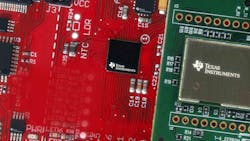Texas Instruments Inc. (IW 500/73) tumbled, worsening a weeks-old rout in chip stocks, after reporting third-quarter revenue that missed estimates and giving a disappointing earnings forecast, indicating that customers may be slowing purchases amid a brewing trade war between the U.S. and China.
Investors view Texas Instruments’ financial outlook as a broader economic barometer because the company has the largest customer list and widest product range in the $400 billion semiconductor industry. The lackluster projections mean that customers are bracing for weaker demand as a result of an escalating trade spat between the world’s two largest economies, according to analysts. Businesses have no incentive to stock up on components they’re uncertain they will be able to use, said Tore Svanberg, an analyst at Stifel Nicolaus & Co.
“There was some slowdown related to tariffs in certain areas, and subsequently it’s spread to everything,” he said. “It’s hard to keep inventory when you don’t know if it’s needed. Demand will be impacted somehow by these tariffs.”
Texas Instruments shares sank about 6% in early trading Wednesday after the report. They closed at $100.25 in New York Tuesday, leaving them down 4% for the year. Anxieties about a sales slowdown in the industry already erased about 10% from the Philadelphia Semiconductor Index in October, putting it on track for the biggest monthly decline since May 2012.
Chief Financial Officer Rafael Lizardi said it’s still too early to say whether the trade dispute is hurting demand, or if order reductions are a natural cooling off following two years of torrid chip-industry growth.
“Demand is slowing across most markets,” Lizardi said in an interview. “What we’re trying to figure out is, is it just the semiconductor cycle or on top of that do we have end-demand slowing because of macro issues? We don’t know.”
Fourth-quarter profit will be $1.14 to $1.34 a share, the Dallas-based company said Tuesday in a statement, and revenue will be $3.6 billion to $3.9 billion. On average, analysts had predicted earnings of $1.38 a share on sales of $4 billion, according to data compiled by Bloomberg.
As electronic functions have been increasingly added to industrial equipment and cars, demand has driven a two-year expansion of Texas Instruments’ revenue. That cycle now appears to be over -- if the company comes in at the lower end of its predicted fourth-quarter revenue range, it would post its first year-over-year decline since the first quarter of 2016.
The world’s sixth-largest chipmaker reported third-quarter net income of $1.57 billion, or $1.58 per share, compared with $1.29 billion, or $1.26 a share, in the same period a year earlier. Revenue rose 3.5% to $4.26 billion. Analysts had estimated a profit of $1.53 a share on sales of $4.3 billion.
If needed, the company plans to slow production to avoid a buildup of inventory, which is currently within normal levels. Investors should expect some accumulation of unsold parts, but only in areas where chips have a long life span and can be sold and used years after they’ve been manufactured, Lizardi said. Spending on research and development won’t be slowed, and the company plans to go ahead with building a new plant that uses better production technology.
The earnings announcement was Texas Instruments’ second since reappointing Rich Templeton to the role of chief executive officer following the ouster of Brian Crutcher, who left after an unspecified code-of-conduct violation. Templeton, who had previously held the job for more than 13 years, has taken the position permanently.
The company’s analog chips perform the fundamental task of translating real-world inputs, like sounds and touch, into electronic signals. Unlike Intel Corp. and Qualcomm Inc., it doesn’t make chips that cost tens of millions of dollars to develop and then quickly become obsolete, meaning Texas Instruments is less vulnerable to sudden swings in demand or competitive pressure.
By Ian King
About the Author
Bloomberg
Licensed content from Bloomberg, copyright 2016.
